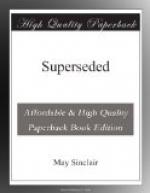Miss Quincey passed a sleepless night reasoning about the reason, a palpitating never-ending night, without a doze or a dream in it or so much as the winking of an eyelid. She reasoned about it for a week between the classes, and in her spare time (when she had any) in the evening (thus running into debt to Sordello again). At the end of the week Miss Quincey’s mind seemed to have become remarkably lucid; every thought in it ground to excessive subtlety in the mill of her logic. She saw it all clearly. There had been some misunderstanding, some terrible mistake. She had forfeited his friendship through a blunder nameless but irrevocable. Once or twice she wondered if Mrs. Moon could be at the bottom of it—or Martha. Had her aunt carried out her dreadful threat of giving him a hint to send in his account? And had the hint implied that for the future all accounts with him were closed? Had he called on Mrs. Moon and been received with crushing hostility? Or had Martha permitted herself to say that she, Miss Quincey, was out when perhaps he knew for a positive fact that she was in? But she soon dismissed these conjectures as inadequate and fell back on her original hypothesis.
And all the time the Old Lady’s eyes, and her voice too, were sharper than ever; from the corner where she dreamed she watched Miss Quincey incessantly between the dreams. At times the Old Lady was shaken with terrible and mysterious mirth. Bastian Cautley began to figure fantastically in her conversation. Her ideas travelled by slow trains of association that started from nowhere but always arrived at Bastian Cautley as a terminus. If Juliana had a headache Mrs. Moon supposed that she wanted that young man to be dancing attendance on her again; if Juliana sighed she declared that Dr. Cautley was a faithless swain who had forsaken Juliana; if Martha brought in the tea-tray she wondered when Dr. Cautley was coming back for another slice of Juliana’s wedding-cake. Mrs. Moon referred to a certain abominable piece of confectionery now crumbling away on a shelf in the sideboard, where, with a breach in its side and its sugar turret in ruins, it seemed to nod at Miss Quincey with all sorts of satirical suggestions. And when Louisa sent her accounts of Teenie who lisped in German, Alexander who wrote Latin letters to his father, and Mildred who refused to read the New Testament in anything but Greek, and Miss Quincey remarked that if she had children she wouldn’t bring them up so, the Old Lady laughed—“Tchee—Tchee! We all know about old maids’ children.” Miss Quincey said nothing to that; but she hardened her heart against Louisa’s children, and against Louisa’s husband and Louisa. She couldn’t think how Louisa could have married such a dreadful little man as Andrew Mackinnon, with his unmistakable accent and problematical linen. The gentle creature who had never said a harsh word to anybody in her life became mysteriously cross and captious. She hardened her heart even to little Laura Lazarus.




